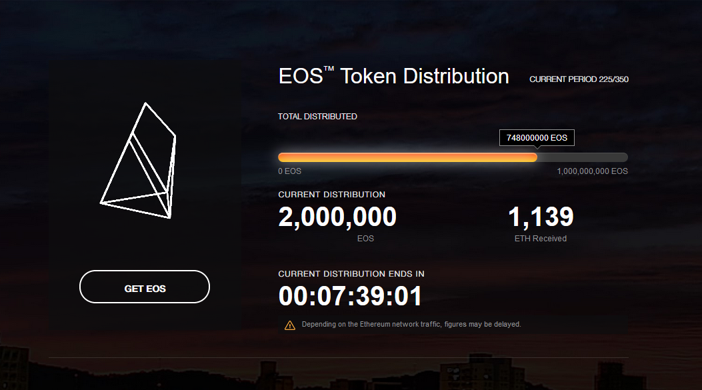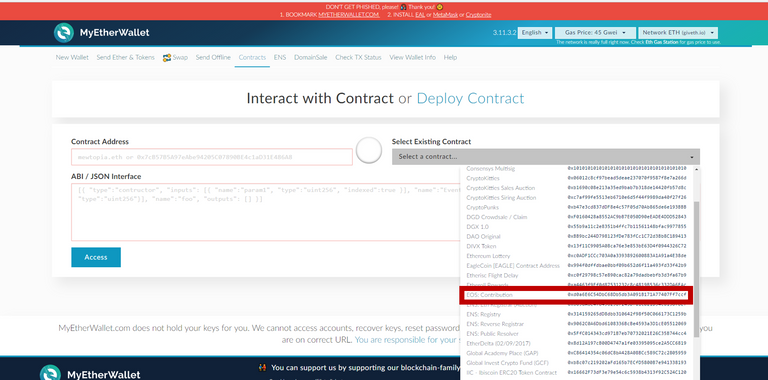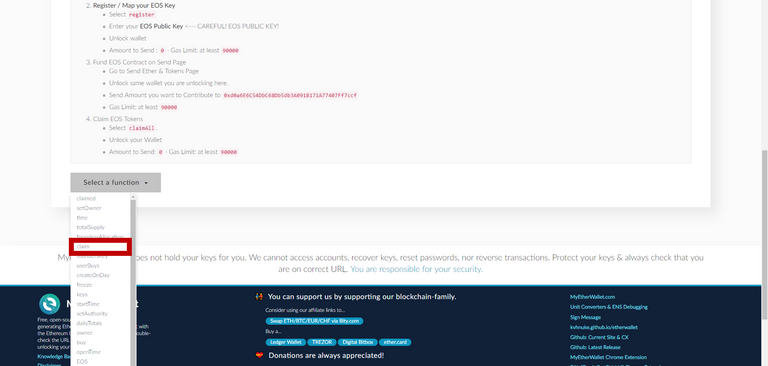
PLEASE NOTE: This list is not intended for citizens of the US or China per the terms and conditions of the crowdsale set by Block.One. We are not affiliated with Block.One. Wed advocate that all users follow the rules as Block.One has set them. If you have questions surrounding your eligibility to participate please contact Block.One.
We are creating this list not because it hasn't been done before (it has many times), but because we are asked by you, the token holder. And we're happy to help!
This isn't a step-by-step guide, this is just a list of items that are important to remember as you go through this process. We hope that this list will empower you to be an EOS token holder with confidence.
There are many ways to participate in the EOS ICO, we are going to cover what we believe is the easiest way for the average user to participate.
A few of things before we begin:
- You can do this now. We don't recommend waiting to register your tokens. If you have decided on the wallet address that will store your tokens for the EOS launch then don't wait, register today.
- We will not put the crowdsale address in this post as you should never trust anything other than the direct source for address. You can find the crowdsale address on www.EOS.io.
- For this list we are assuming that you are using My Ether Wallet. Type "Myetherwallet.com" directly into your browser, never click links to wallets. Phishing is the leading cause of token theft. Be smart, be vigilant. If you are using a Ledger Nano or Trezor with My Ether Wallet, great. If you don't know what those are we suggest you research them as they provide an extra layer of security for your tokens.
- We are assuming you know how to use My Ether Wallet. If you do not there are plenty of tutorials on youtube.
- When we refer to EOS tokens we are referring to the EOS ERC-20 token that exists on the Ethereum network.
- Use www.EOSSCAN.io to track the current period and price of the EOS ICO. EOSCHART.com is an alternative.

Location of EOS Crowdsale Contract on My Ether Wallet
Here's how the EOS ICO process works in its simplest form:
- You send ETH directly to the crowdsale contract.
- The ICO period ends.
- You claim your EOS tokens.
If we were to write out the formula that calculates how it would look like this.
(2,000,000 / Total ETH Sent By Everyone) * ETH You Personally Sent = Total EOS you purchased
If you don't want to participate in the ICO and instead have chosen to purchase your EOS tokens from an exchange, that's ok. This list can still help you.
Now that we have the basics out of the way here are the top ten things to remember.
1. Never Send ETH from an exchange to the ICO crowdsale address.
The crowdsale records the address that it received ETH from. Your sending address and receiving address aren't always the same on an exchange. If you send from an exchange address you will be unable to claim your tokens without contacting your exchange for help. Use a supported wallet like My Ether Wallet to avoid this.
2. You aren't really registering your tokens, you are actually registering your address.
When you successfully register your tokens the EOS crowdsale contract is taking note of the address of where tokens are. The amount of EOS in that address is recorded in snapshots by Block.One that are taken at different intervals. The last snapshot will occur right before the final EOS.IO software is released. If you have EOS tokens in an ETH address, and you've already registered that address, then you can move tokens in and out of that same address at a later date. As long as all of your EOS tokens are in your registered address before the final snapshot on June 1, 2018 at 22:59:59 UTC. You can register multiple addresses should you wish and spread your tokens out but we don't recommend it.
3. Use the 'claim' function, not 'claim all' on My Ether Wallet.
The 'claim all' function will check every single previous period for any tokens that should belong to you and this results in high gas costs a.k.a. transaction fees. If you know the period that you submitted ETH to crowdsale simply use the "claim" function for that period instead. This avoids a failed transaction due to insufficient gas.

4. Never register your tokens with an exchange address.
This is similar reasoning to #1. If hold your EOS tokens in an exchange address you cannot register that exchange address as it's not really yours. You will lose your tokens if you do this. Register your tokens from a supported wallet or method that Block.One recommends on www.eos.io
5. When using "Claim" use a low Gwei price and a high gas limit.
We've found that interfacing with a smart contract takes more gas then sending a transaction over the ETH network. We recommend setting a low Gwei and a 250K gas limit to near guarantee a successful transaction.
6. Once you register your tokens write down your private key, twice, and store them in separate places.
This is your lifeline. This is your access to those tokens come EOS launch. Do not lose this and do not reveal it, ever. Don't save it on your computer. If you do have a digital copy keep it on an encrypted USB drive (thanks @azurejasper). Proper security practices are paramount and no one is going to look out for you except you.
7. Verify that you've properly registered your tokens to your ETH address.
Use the 'Keys' function when interfacing with the EOS contract on My Ether Wallet. Enter your Ethereum public key in the 'address' field. Click 'read'. Verify that your EOS public address is displayed. Now verify it again.
8. Never use a third party EOS public/private key generator unless you are 100% sure you can trust it.
Under the 'Register' instructions for 'MyEtherWallet' on www.eos.io you will see a button for 'Generate EOS Keys'. We recommend you use this and only this to generate your public/private keys. Again, phishing is the single greatest cause of token theft.

9. There are no EOS token airdrops, ever.
We are seeing a new account every few days on twitter claiming that they are airdropping EOS tokens in exchange for ETH. This is a scam. Don't do it. Plain and simple.
10. If you are not using My Ether Wallet then be sure to verify that the wallet you are using is supported by the EOS ICO.
You can do this on EOS website or check out the screenshot we've provided. This list may not be up to date so be sure to check with your own wallet developers.

11. dApp airdrops, like Everipedia iQ tokens, may happen prior to June 1.
(We know, but Top 10 sounds better than Top 11) To ensure that you are part of airdrops for dApps to be released on the EOS network make sure you register your tokens! While we're sure that dApp teams that are choosing to airdrop ERC-20 tokens onto current EOS token holders are taking into account that not everyone has registered their tokens yet but we still say, "Why test that?".
Did we forget anything? Let us know in the comments below. Have questions about EOS.IO? Let us know and maybe we can help!

https://www.eosnewyork.io/
https://twitter.com/eosnewyork
https://medium.com/@eosnewyork
https://steemit.com/@eosnewyork
https://www.meetup.com/EOS-New-York/
Terrific list of very informative and useful tips. @eosnewyork already proving to be a valuable asset to the EOS community. Keep it rolling guys.
Great quick summary. There are dozens of questions per day regarding EOS tokens and a proper wallet. I think it's important to stress 2 things:
Great suggestions!
I'd add "encrypted USB" to point 6. You don't want to loose a flash drive and worry someone could have access to your unencrypted keys.
Good suggestion. Will add it now.
thanks for the update , that was well in depth.
Nice work on this. I think that a lot of people still don't understand EOS tokens and this will help.
I do have one question though... New York is in the US so I'm a little confused on how that works since the EOS tokens are not intended for US/China citizens? You guys are obviously very fired up about EOS and being participants in the network. Will block producers need to hold EOS (the real token), or will only users of bandwidth need them? Thanks.
I though Exodus was a compatible wallet?
So if someone doesn´t know the period when they bought the EOS tokens, would they have to use the "Claim All" option on MyEther?